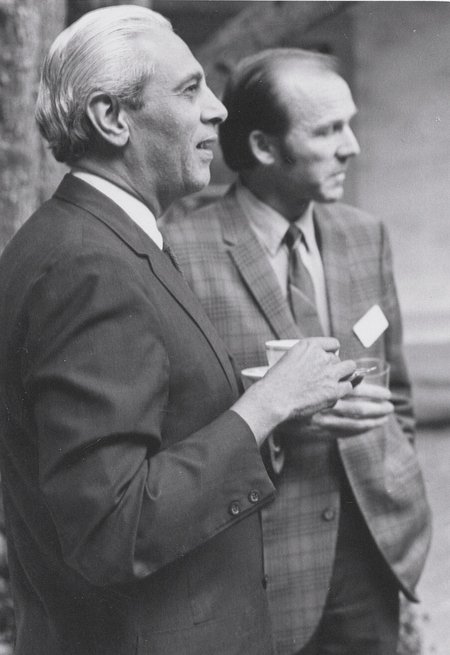The Indian Department of Space / Indian Space Research Organisation (ISRO) has established a fellowship at the California Institute of Technology (Caltech) in the name of Satish Dhawan (1920–2002), a Caltech alumnus (Eng '49, PhD '51) and a pioneer of India's space program.
The Satish Dhawan Fellowship enables one aerospace engineering graduate per year from the Indian Institute of Space Science and Technology (IIST) to study at the Graduate Aerospace Laboratories at Caltech (GALCIT), as Dhawan himself did more than 60 years ago, when GALCIT was the Guggenheim Aeronautical Laboratory. Dhawan went on to serve as the director of the Indian Institute of Science (IISc), chairman of the Indian Space Commission and the ISRO, and president of the Indian Academy of Sciences. In 1969 he was named a Caltech Distinguished Alumnus.
Chaphalkar Aaditya Nitin, an IIST graduate with a Bachelor of Technology degree in aerospace engineering, has been named the first student to receive the fellowship and will start classes at GALCIT in October.
According to GALCIT director Guruswami (Ravi) Ravichandran, the John E. Goode, Jr., Professor of Aerospace and professor of mechanical engineering, ISRO established the fellowship to create a permanent pipeline of aerospace engineering leaders who will guide India's space program into the future.
"India has a very strong domestically grown space program," explains Ravichandran. "The ISRO is hoping to maintain its momentum by training students in much the same way that Dhawan was trained when he went through GALCIT decades ago."
The first three directors of what is now India's National Aerospace Laboratories were GALCIT alumni—Parameswar Nilakantan (MS '42), S. R. Valluri (MS '50, PhD '54), and Roddam Narasimha (PhD '61 "The ISRO is honoring Dhawan and Caltech with this fellowship, and it is also recognizing the historical connections between engineers and scientists in the United States and India," says Ares Rosakis, Caltech's Theodore von Kármán Professor of Aeronautics and Mechanical Engineering and Otis Booth Leadership Chair, Division of Engineering and Applied Science. "It is an endorsement of GALCIT's fundamental research approach and rigorous curriculum.
"Most academic fellowships come from private philanthropy. It is extremely rare for a government institution to endow a fellowship intended for a private research institution such as Caltech," he says.
"GALCIT has had impact on aeronautics and aerospace development in the United States and abroad, not by training engineers in large numbers but by training engineering leaders," Rosakis says. "GALCIT graduates include CEOs of aerospace companies and the heads of departments at places like MIT, Georgia Tech, and the University of Illinois. If we were to create one von Kármán every half century, as well as a few aerospace CEOs, and a few Dhawans, we would be happy."
 Satish Dhawan and colleague Anatol Roshko at a celebration of Diwali, the Hindu festival of lights, organized by Indian students on the Caltech campus in 1972.
Credit: Virendra Sarohia
Satish Dhawan and colleague Anatol Roshko at a celebration of Diwali, the Hindu festival of lights, organized by Indian students on the Caltech campus in 1972.
Credit: Virendra Sarohia

